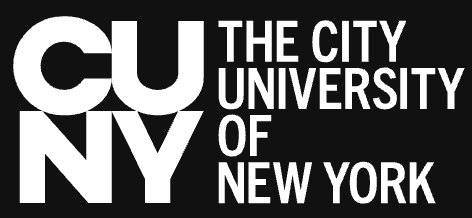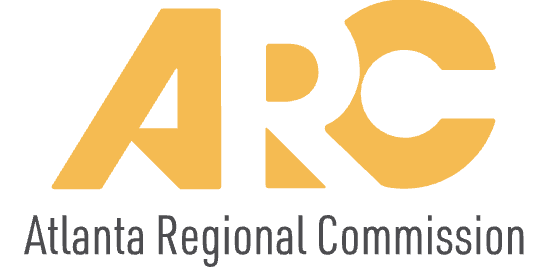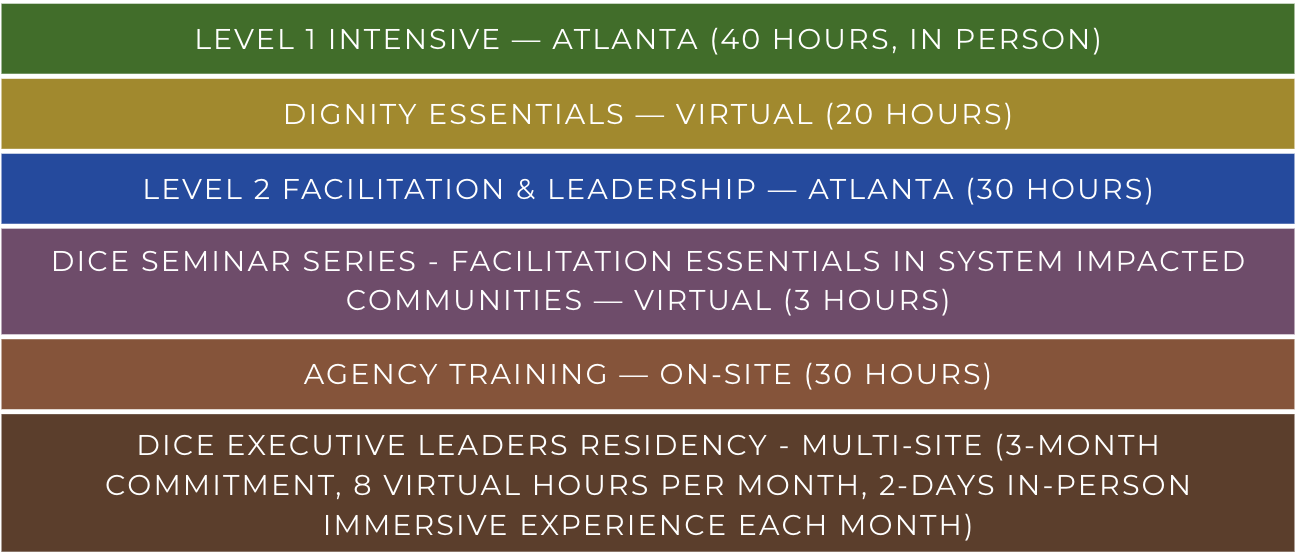A cohort-based certification designed for city planning, social-services, youth-development, mental-health providers, community-based partners, and civic leaders committed to strengthening community trust and impact. This intensive learning series is grounded in a future-ready, people-centered methodology, equipping cross-sector teams with a dignity-infused engagement framework that enhances organizational effectiveness, supports durable community relationships, and aligns with goals for accountability, sustainability, measurable outcomes, and effective decision-making.
Past attendees include:
The Thrivance Group (Soon to be the Thrivance Institute for Holistic Advocacy) now provides a full suite of programs designed to meet teams and individuals wherever they are in their community engagement journey. Our expanded Spring 2026 Dignity-Infused Community Engagement Program includes cohort-based certification, advanced masterclasses, organizational licensing pathways, and sector-specific professional development for agencies, firms, and community-facing institutions.
Each offering is intentionally designed so that leaders across planning, social services, youth development, mental health, community organizing, and public-sector practice can access the level of training and support that best fits their work, capacity, and goals.
There are six learning models available within our Spring 2026 Dignity-Infused Community Engagement Program:
Below is a guide to help you determine which option is the best fit for you or your organization. Registrations and inquiries will receive email responses including details for location, lodging, and calendar holds within 48 hours.
*At checkout, use discount code: AGENCYINVOICE to register with a commitment to pay using your agency’s funds
*At checkout, use discount code: PAYLATER to make a 25% deposit today with a commitment to pay in installments later.
We will follow up within 48 hours to set up payment arrangements.
Price: $1,250 (Certification) | Capacity: 80 | Dates: March 9 - 11, 2026
Location: Midtown Atlanta, GA Area
The Level 1 Intensive Dignity-Infused Community Engagement Cohort is a 40 hour peer learning community and training designed to strengthen the capacity of staff who work directly with communities, residents, service recipients, and stakeholder groups. Grounded in evidence-informed engagement principles, the program provides actionable tools that help agencies improve trust, increase participation, reduce service friction, and enhance the effectiveness of community-facing programs.
About Level 1
This program has been created for practitioners in social services, youth development, housing, public health, transportation, and urban planning. The Level 1 Cohort equips participants with the skills needed to:
Recognize and mitigate engagement practices that inadvertently cause harm or discourage participation;
Strengthen cross-department collaboration;
Support compliance with public participation, accessibility, and program outreach requirements; and
Improve the consistency and quality of staff interactions with the public.
Produce immediate, measurable improvements in service quality while reducing long-term inefficiencies
Best for:
Practitioners who want deep immersion and hands-on practice
Frontline staff, community-facing teams, planners, outreach workers
Those who prefer in-person, experiential learning
Choose this if you want:
Comprehensive, high-contact training
A full introduction to dignity-infused community engagement
Live practice labs, case simulations, and cohort accountability
Enhanced versions of the features included in the Dignity Essentials cohort
All tools, templates, and frameworks provided through the cohort are directly applicable to existing agency workflows, ensuring that staff return with actionable strategies—not abstract theory. The curriculum aligns with widely recognized goals around program accessibility, public engagement standards, equity in service delivery, and ethical community-facing practice, making it an appropriate and defensible investment for civil service and non-profit agencies.
Price: $375 (Non-Certification) | Capacity: 150 | Dates: March 18-20, 2026 | Time: 12pm - 5pm ET each day
Location: Zoom
DICE Essentials is a 20-hour virtual professional training designed for staff who interact with the public and need accessible, flexible development in community engagement, service delivery, and cross-sector communication. The program provides a cost-efficient alternative to the in-person Level 1 Intensive while maintaining the core competencies that help agencies improve trust, strengthen service interactions, and enhance program outcomes across social services, housing, public health, youth development, transportation, and urban planning.
Best for:
Flexible scheduling for agencies with shift-based or high-demand roles;
No travel or lodging expenses, reducing budget barriers;
Interactive virtual labs, discussion-driven learning, and digital toolkits;
Digital materials, allowing staff to revisit content and apply tools immediately.
Choose this if you want:
A solid foundation in the dignity-infused method
Virtual delivery that fits into busy schedules
About DICE Essentials
Participants learn practical, evidence-informed approaches to:
Recognizing and reducing unintentional harm in service interactions;
Building trust in situations where time, resources, or public sentiment are strained;
Improving participation in public meetings, outreach efforts, and service delivery;
Enhancing public participation and accessibility requirements; and
Strengthening internal team coordination around community engagement.
The content is streamlined for a virtual environment, with a focus on a selection of tools, essential frameworks, and immediate on-the-job application. We prefer and recommend the certification track, but have retained this option to ensure accessibility to our programming. As such, the virtual Essentials training does not include:
The hands-on, in-person practice labs offered in the Level 1 Intensive;
Extended role-play practicum;
On-site fieldwork or location-based application modules;
Networking dinners or community observation activities;
High-touch, small-group facilitation exercises that are only feasible in person;
Certification
Price: $850 | Capacity: 50 | Dates: March 23-25, 2026
Location: Atlanta, GA Midtown Area
The Level 2 Facilitation & Leadership Cohort is a 30-hour advanced training designed for staff who already have foundational experience in Dignity-Infused Community Engagement and need deeper, more specialized skills to lead teams, guide complex conversations, and improve organizational outcomes. This program is ideal for mid-level and senior practitioners in social services, youth development, mental health, housing, planning, public health, and other community-facing departments who frequently manage groups, facilitate meetings, or coordinate multi-stakeholder processes.
Choose this if you want:
Advanced facilitation tools
Leadership skill-building
Structured pathways to internal or contracted facilitation roles
Best for:
Mid-level or senior practitioners, supervisors, facilitators
Alumni of Level 1 or Essentials
Emerging leaders who support teams, run groups, or lead engagement processes
About Level 2
Building on the core competencies of Level 1 or DICE Essentials, Level 2 strengthens ability to:
Apply dignity-centered frameworks to complex cases involving multiple agencies or community groups;
Strengthen internal workflows around engagement, communications, and stakeholder coordination;
Guide cross-functional teams through problem-solving and decision-making;
Support supervisors and department heads by modeling consistent, high-quality public-facing practice.
The Level 2 Cohort offers a more strategic, leadership-focused experience. Unlike Level 1 and DICE Essentials, this program emphasizes:
Advanced facilitation techniques for complex or multi-stakeholder environments;
Leadership identity development and reflective practice;
Scenario-based learning using real department or regional case studies;
Team leadership tools for improving internal alignment and communication;
Applied practice labs that simulate high-pressure or high-impact conversations;
Coaching-style frameworks for mentoring or supervising staff.
Level 2 does not repeat foundational content from earlier cohorts—ensuring efficient, targeted use of agency time and resources. The Level 2 Facilitation & Leadership Cohort equips agencies with internal leaders who can steward complex conversations, guide teams through uncertainty, and model the high-quality community engagement expected of public-serving institutions—making it a legitimate, fiscally sound use of training funds.
Price: $85 per seminar | Capacity: 200 | Date: February 12, 2026 | Time: 12pm-3pm ET
Location: Zoom
The Data Without Harm Seminar is a targeted 3-hour professional development session designed to help staff collect, interpret, and use community data responsibly—without causing harm, discouraging participation, or compromising the quality of input that agencies rely on for planning, service delivery, and decision-making.
This seminar is particularly valuable for teams in social services, youth development, mental health, housing, public health, transportation, and urban planning, where data collection tools (surveys, assessments, intake forms, public meeting feedback, interviews, focus groups, case notes, etc.) directly affect outcomes, compliance, and community trust.
Choose this if you want:
A concise, practice-focused training experience
Deep dives into specific engagement challenges
Affordable, low-lift professional development
Best for:
Alumni wanting targeted, applied refreshers
Staff needing short-form PD
Teams exploring the Institute before committing to a full cohort
About Data without Harm
Participants learn how to:
Design data collection tools that are ethical, accessible, and culturally responsive;
Avoid common errors that reduce data quality, suppress participation, or create community confusion;
Identify when data requests may retraumatize or stigmatize service recipients;
Build trust through transparent communication about why and data use;
Strengthen alignment between data-gathering practices and regulatory, grant, and program requirements;
This seminar improves data quality and reduces inefficiencies, ensuring staff collect the information they need without creating additional barriers for community members. Every attendee receives: a Dignity-Safe Data Checklist, a Data Without Harm rubric for evaluating existing tools, sample survey and assessment templates, and a revised version of one of their own agency forms or data instruments.
Price: $85 per seminar | Capacity: 200 | Date: March 5, 2026 | Time: 12pm-3pm ET
Location: Zoom
Facilitation Essentials in System-Impacted Communities is a 3-hour applied training designed for staff who engage directly with individuals and families impacted by the criminal legal system, foster care, public housing systems, school discipline systems, behavioral health institutions, and other government or quasi-government structures.
This seminar provides frontline practitioners, outreach staff, case managers, planners, and engagement specialists with the essential tools to facilitate conversations that are clear, safe, structured, and responsive to the realities of system involvement.
Best for:
Alumni wanting targeted, applied refreshers
Staff needing short-form PD
Teams exploring the Institute before committing to a full cohort
Choose this if you want:
A concise, practice-focused training experience
Deep dives into specific engagement challenges
Affordable, low-lift professional development
About Facilitation Essentials in System Impacted Communities
Participants learn how to:
Facilitate community meetings, small groups, and case discussions involving people with lived experience in system interaction;
Recognize and reduce trauma;
Manage high-stress or emotionally charged exchanges while maintaining dignity;
Communicate program expectations, boundaries, and processes without escalating fear, frustration, or distrust;
Build participation among those who often go unheard, surveilled, or misunderstood.
This seminar equips staff with facilitation tools that reduce conflict, increase clarity, and improve the quality of engagement for everyone involved. Each attendee receives: a facilitation structure map for system-impacted discussions; scripts for de-escalation and boundary-setting that preserve dignity; a harm-reduction communication checklist; and a revised outline for one of their upcoming meetings or engagements.
Price: Contact for Pricing | Capacity: 2 Agencies | Dates: Bookings available in April and May 2026
The On-Site Agency Training is a 30-hour customized professional development experience delivered directly to government, nonprofit, and public-serving institutions. Designed to strengthen internal alignment, improve service delivery, and enhance agency-wide engagement practices, this training brings the Dignity-Infused Community Engagement (DICE) framework into an organization’s own environment—using real cases, real workflows, and real community contexts.
This on-site model is ideal for departments in social services, youth development, mental health, housing, public health, transportation, planning, workforce development, and public engagement, where consistent, high-quality community interaction is essential to mission success.
Designed Around Your Agency’s Real Work
Unlike general-purpose training, the On-Site Agency Training includes:
Department-specific diagnostics (reviewing existing forms, meetings, workflows);
Case-based labs using real situations your team encounters;
Customized implementation tools that match your operating environment;
Team-aligned strategies for service delivery, engagement, and public communication;
Optional leadership briefings to support policy or operational changes.
What Is Not Included (for fiscal and compliance clarity)
To ensure transparency for procurement, budget oversight, and executive approval, the on-site model does not include:
Clinical interventions or therapeutic services;
Legal advice or regulatory determinations;
External evaluations or audits;
Software systems or technology implementation;
Long-term consulting (can be contracted separately if desired).
Choose this if you want:
Customized training tailored to your department’s cases, sites, and priorities
On-site delivery for staff
Tools that can be integrated into policy, operations, and cross-team workflows
Virtual and hybrid options available
Best for:
Government agencies, large nonprofits, multi-site organizations
Departments needing consistent, agency-wide engagement standards
Leaders wanting team alignment and system-level application
Price: $3,250 (Application Process) | Capacity: 25
Dates and Locations: Second and fourth Fridays in April - June 2026 (virtual); April 29-30, 2026 (Oakland, CA); May 20-21, 2026 (Atlanta, GA); June 10-11, 2026 (Bentonville, Arkansas)
The DICE Executive Leaders Residency is a selective, hybrid leadership program designed for senior executives who oversee community-facing operations, strategic planning, service delivery, public engagement, or cross-sector initiatives. This residency offers an immersive, regionally grounded experience that equips high-level leaders to apply the Dignity-Infused Community Engagement (DICE) framework to complex organizational, community, and governance challenges.
Delivered through a combination of in-person intensives, virtual leadership labs, and real-world application, the Residency strengthens executives’ capacity to:
Set agency-wide standards for ethical, clear, and effective community engagement;
Steward trust in environments shaped by strained public confidence;
Iimprove interdepartmental coordination around service delivery, outreach, and communications;
Guide teams through high-pressure decisions and cross-agency collaboration;
Evaluate and redesign engagement practices that affect public participation, system navigation, or program outcomes;
Advance organizational transformation through responsible, dignity-centered leadership.
Unlike the Level 1, Essentials, or Level 2 programs, the Residency is not focused on frontline or mid-level skill-building. Instead, it provides executive-level strategic tools, including:
Region-specific case analysis tailored to the leader’s context;
High-level scenario planning for system-wide impact;
Cross-sector executive peer exchange and problem-solving;
Structured reflection on decision-making, authority, accountability, and public trust;
Guidance on embedding dignity-centered practices at the policy, operational, and cultural levels.
The residency model allows executives to work deeply on issues central to agency performance, organizational culture, community relations, and long-term sustainability.
Participants receive:
6 days of in-person immersion focused on executive strategy and applied leadership;
4 virtual leadership labs that support ongoing integration of concepts and tools;
An executive project that ties residency learning to a real organizational challenge;
Access to the Dignity Exchange, a peer network of leaders advancing this method;
Templates, frameworks, and strategic tools designed for high-level application.
What the Residency Does Not Include
Frontline or entry-level engagement training;
Clinical, therapeutic, or legal services;
Long-term consulting or implementation services (can be contracted separately);
Vendor-driven technology, software, or system procurement;
Public-facing facilitation performed on behalf of the agency.
Choose this if you want:
A leadership-focused application of the dignity framework
Hybrid learning with both strategic and relational tools
A cohort of cross-industry peers
Best for:
Corporate leaders, executives, and management teams
Organizations prioritizing culture, trust, and ethical leadership
Leaders navigating community perception, public accountability, or high-impact decisions
Ready to Redefine Engagement in Your City?
Join the DICE Certification Program and become part of the next generation of civic leaders.
FREQUENTLY ASKED QUESTIONS
-
Yes. We provide group discounts for organizations registering multiple participants, as well as limited scholarships to ensure accessibility. Please contact us for details at info@thrivanceproject.com
-
You’ll need a stable internet connection, Zoom access, and the ability to download course materials (PDF format). No special software is required.
-
You can reach us atinfo@thrivanceproject.com. We’re happy to help with registration, accessibility needs, or general questions.
-
We want the training to be accessible to as many people as possible. Reach out to us directly to discuss accommodations at info@thrivanceproject.com
-
Certificates will be distributed digitally 7 days after the completion of your session. You will have the option to purchase a physical certificate when you register for the class.
-
You may purchase a seat as a gift. Please reach out to coordinate registration at info@thrivanceproject.com
Have another question? Reach out to us at info@thrivanceproject.com or here:
ADDITIONAL INFORMATION
Early Registration
Early Registration is strongly advised as class size is limited. We can not accommodate those who have not registered in advance of class date.
Framing Community Engagement in a Shifting Landscape
The landscape of public work is changing. Where once “equity” was a broadly welcomed framework, today many professionals face increasing scrutiny, shifting policies, and even professional risk when advancing values-based practices.
Our Dignity-Infused Community Engagement trainings have always been rooted in the belief that planning, governance, and consulting should center dignity, belonging, and fairness. That commitment has not changed—and will not change.
What has evolved is how we frame and deliver this training. In today’s environment, we are adapting our approach so that participants can confidently use and apply these methods without fear of professional recourse. The training emphasizes:
Resilient Language and Framing – Practical strategies for communicating values in ways that resonate across political contexts.
Durable Practices – Tools that prioritize inclusion and trust-building while aligning with evolving professional standards.
Courage with Care – Guidance for advancing meaningful engagement in ways that protect your credibility and your career.
By completing this training, you’ll gain not only proven techniques for effective engagement, but also the ability to practice them with confidence in a post-equity climate.
Our values remain steady. Our methods have been re-tuned for the realities you face today.
Continuing Legal Education (CLE)
We recognize that many participants may wish to apply this training toward their continuing education requirements. Upon request, we will diligently prepare and submit the necessary documentation to support CLE credit approval.
Please note, however, that approval is determined by individual state bar associations and we cannot guarantee that credits will be awarded. We encourage participants to check with their licensing body in advance to understand specific requirements.
Cancelation Policy
Full Refund Eligibility - If notice of cancellation is given 14 calendar days in advance of the scheduled training your payment can be refunded. All refunds are issued by ACH transfer. Otherwise, no refunds will be given.
Rescheduling Options - If you cancel between 8 to 13 days before the training, you can reschedule once to another available training date without any additional charge. If you cancel between 1 to 7 days before the training, you can reschedule once to another available date for a $50 fee.
No Show Policy - If you do not attend or notify us on the first day of the scheduled class your registration will automatically be cancelled. The registration cannot be transferred or rescheduled. No refund will be issued.






































